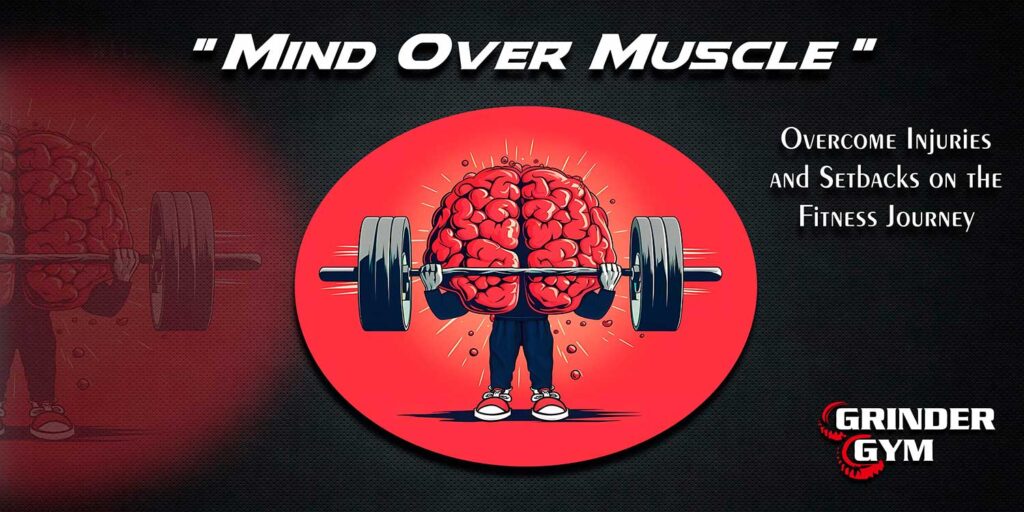
Embarking on a fitness journey is an exciting endeavor, but it comes with its fair share of challenges. From mental barriers to physical obstacles, setbacks are inevitable. However, with the right mindset and strategies, it’s possible to overcome these hurdles and continue progressing towards your fitness goals. In this article, we’ll explore common obstacles encountered during the pursuit of fitness goals and provide practical tips and motivational advice to help you bounce back from setbacks and stay committed to long-term progress.
Mentality
Lack of Motivation and Discipline:
Recognize that motivation fluctuates and cultivate discipline by establishing a consistent routine. For example, start by scheduling a workout three times a week and commit to showing up, even if you don’t feel particularly motivated that day. Find intrinsic motivators such as the satisfaction of progress and the joy of movement.
Unrealistic Expectations:
Set SMART goals that are Specific, Measurable, Achievable, Relevant, and Time-bound. Focus on gradual progress rather than immediate results to avoid discouragement. Celebrating milestones, no matter how small, reinforces positive progress and keeps you engaged.
Negative Self-talk:
Practice self-compassion and challenge negative thoughts with positive affirmations. Journaling positive affirmations about your abilities and progress can be a powerful tool to combat negative self-talk. Surround yourself with a supportive environment that fosters self-belief and confidence.
Lifestyle
Time Constraints:
Prioritize exercise by scheduling it into your daily routine, even if it means starting with shorter workouts. Incorporate time-saving strategies such as high-intensity interval training (HIIT) or multitasking activities like walking meetings. Finding activities you genuinely enjoy, like dancing or hiking, can make exercise feel less like a chore and more like a fun way to spend your time.
Inconsistent Routine:
Plan ahead and set realistic expectations for your exercise schedule, considering potential disruptions. Flexibility is key; adapt your workouts to fit your changing schedule rather than abandoning them altogether. Utilizing a fitness tracker or app can help you visualize your progress and stay on track with your workout schedule.
Changes in Life Circumstances:
Embrace adaptability and view setbacks as temporary challenges rather than permanent barriers. Explore alternative forms of exercise that accommodate your current circumstances, such as home workouts or online classes. While adaptability is key, it’s equally important to listen to your body during challenging times. Adjust your goals or exercise intensity if needed to prioritize recovery.
Physical
Injuries:
Prioritize rest and recovery to allow your body to heal properly before returning to exercise. Seek professional guidance from a doctor or physical therapist before resuming exercise, especially after a significant injury, to ensure a safe and effective return to your fitness routine.
Lack of Knowledge or Guidance:
Educate yourself on proper exercise techniques and seek guidance from qualified professionals. Consider working with a certified personal trainer, even for a short period, to gain foundational knowledge and develop a safe and effective exercise program tailored to your specific needs and goals. Gradually increase intensity and volume to prevent overtraining and reduce the risk of injury.
Plateaus:
Embrace plateaus as opportunities for growth and experimentation rather than setbacks. Mix up your routine with new exercises, training modalities, or challenges to stimulate progress and prevent stagnation.
Social
Lack of Support:
Surround yourself with a supportive network of friends, family, or like-minded individuals who share your fitness goals. Communicate your needs and seek encouragement from those who understand and respect your journey. Online fitness communities can be a great way to connect with like-minded individuals who can offer encouragement and share valuable tips.
Social Pressures:
Set boundaries and prioritize your own well-being, even if it means distancing yourself from negative influences. Lead by example and inspire others through your dedication and commitment to fitness.
Conclusion
Setbacks are an inevitable part of the fitness journey, but they don’t have to derail your progress. By cultivating a resilient mindset, adopting practical strategies, and seeking support when needed, you can overcome obstacles and continue moving forward towards your long-term fitness goals. Remember, the journey may have its ups and downs, but with perseverance and determination, success is within reach.
Disclaimer: The information provided in this article is for educational and informational purposes only. It is not intended as a substitution for professional medical advice, diagnosis, or treatment. Always seek professional advice from your physician or qualified healthcare provider with any questions you might have regarding your physical and mental health.
EXERCISES

COMMUNITY
